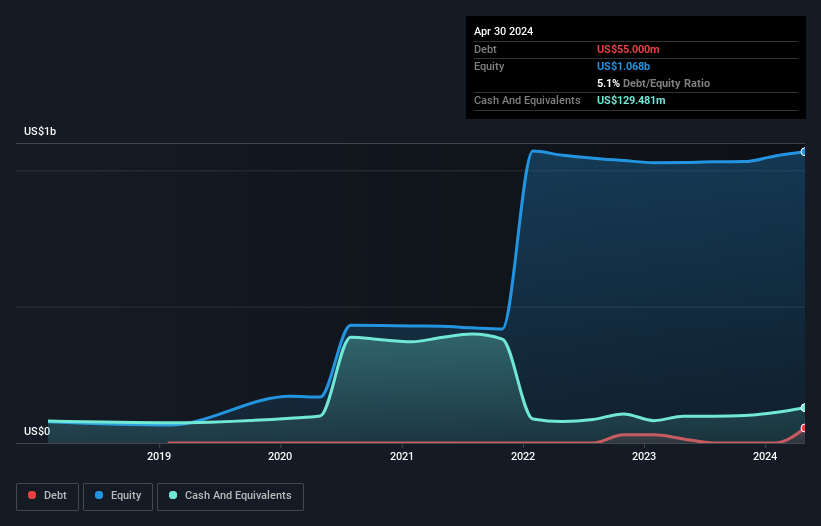
Some say volatility, rather than debt, is the best way to think about risk as an investor, but Warren Buffett famously said that 'Volatility is far from synonymous with risk.' So it might be obvious that you need to consider debt, when you think about how risky any given stock is, because too much debt can sink a company. Importantly, nCino, Inc. (NASDAQ:NCNO) does carry debt. But is this debt a concern to shareholders?
When Is Debt A Problem?
Debt and other liabilities become risky for a business when it cannot easily fulfill those obligations, either with free cash flow or by raising capital at an attractive price. In the worst case scenario, a company can go bankrupt if it cannot pay its creditors. However, a more usual (but still expensive) situation is where a company must dilute shareholders at a cheap share price simply to get debt under control. Of course, plenty of companies use debt to fund growth, without any negative consequences. When we examine debt levels, we first consider both cash and debt levels, together.
Check out our latest analysis for nCino
How Much Debt Does nCino Carry?
The image below, which you can click on for greater detail, shows that at April 2024 nCino had debt of US$55.0m, up from US$15.0m in one year. However, it does have US$129.5m in cash offsetting this, leading to net cash of US$74.5m.

How Strong Is nCino's Balance Sheet?
The latest balance sheet data shows that nCino had liabilities of US$221.7m due within a year, and liabilities of US$134.2m falling due after that. Offsetting this, it had US$129.5m in cash and US$78.5m in receivables that were due within 12 months. So its liabilities total US$147.9m more than the combination of its cash and short-term receivables.
Since publicly traded nCino shares are worth a total of US$3.52b, it seems unlikely that this level of liabilities would be a major threat. But there are sufficient liabilities that we would certainly recommend shareholders continue to monitor the balance sheet, going forward. Despite its noteworthy liabilities, nCino boasts net cash, so it's fair to say it does not have a heavy debt load! When analysing debt levels, the balance sheet is the obvious place to start. But ultimately the future profitability of the business will decide if nCino can strengthen its balance sheet over time. So if you want to see what the professionals think, you might find this free report on analyst profit forecasts to be interesting.
In the last year nCino wasn't profitable at an EBIT level, but managed to grow its revenue by 15%, to US$491m. We usually like to see faster growth from unprofitable companies, but each to their own.
So How Risky Is nCino?
Although nCino had an earnings before interest and tax (EBIT) loss over the last twelve months, it generated positive free cash flow of US$78m. So taking that on face value, and considering the net cash situation, we don't think that the stock is too risky in the near term. With revenue growth uninspiring, we'd really need to see some positive EBIT before mustering much enthusiasm for this business. There's no doubt that we learn most about debt from the balance sheet. But ultimately, every company can contain risks that exist outside of the balance sheet. For example, we've discovered 2 warning signs for nCino that you should be aware of before investing here.
If, after all that, you're more interested in a fast growing company with a rock-solid balance sheet, then check out our list of net cash growth stocks without delay.
New: Manage All Your Stock Portfolios in One Place
We've created the ultimate portfolio companion for stock investors, and it's free.
• Connect an unlimited number of Portfolios and see your total in one currency
• Be alerted to new Warning Signs or Risks via email or mobile
• Track the Fair Value of your stocks
Have feedback on this article? Concerned about the content? Get in touch with us directly. Alternatively, email editorial-team (at) simplywallst.com.
This article by Simply Wall St is general in nature. We provide commentary based on historical data and analyst forecasts only using an unbiased methodology and our articles are not intended to be financial advice. It does not constitute a recommendation to buy or sell any stock, and does not take account of your objectives, or your financial situation. We aim to bring you long-term focused analysis driven by fundamental data. Note that our analysis may not factor in the latest price-sensitive company announcements or qualitative material. Simply Wall St has no position in any stocks mentioned.
Have feedback on this article? Concerned about the content? Get in touch with us directly. Alternatively, email editorial-team@simplywallst.com
About NasdaqGS:NCNO
nCino
A software-as-a-service company, provides software solutions to financial institutions in the United States, the United Kingdom, and internationally.
Adequate balance sheet and fair value.
Similar Companies
Market Insights
Community Narratives



